Dive into Seoul's dynamic blend of ancient history and cutting-edge modernity with our guide. Explore majestic palaces, vibrant K-...
Mexico City Travel Guide 2025
| Updatedby Yuliya Karotkaya · 23 mins read
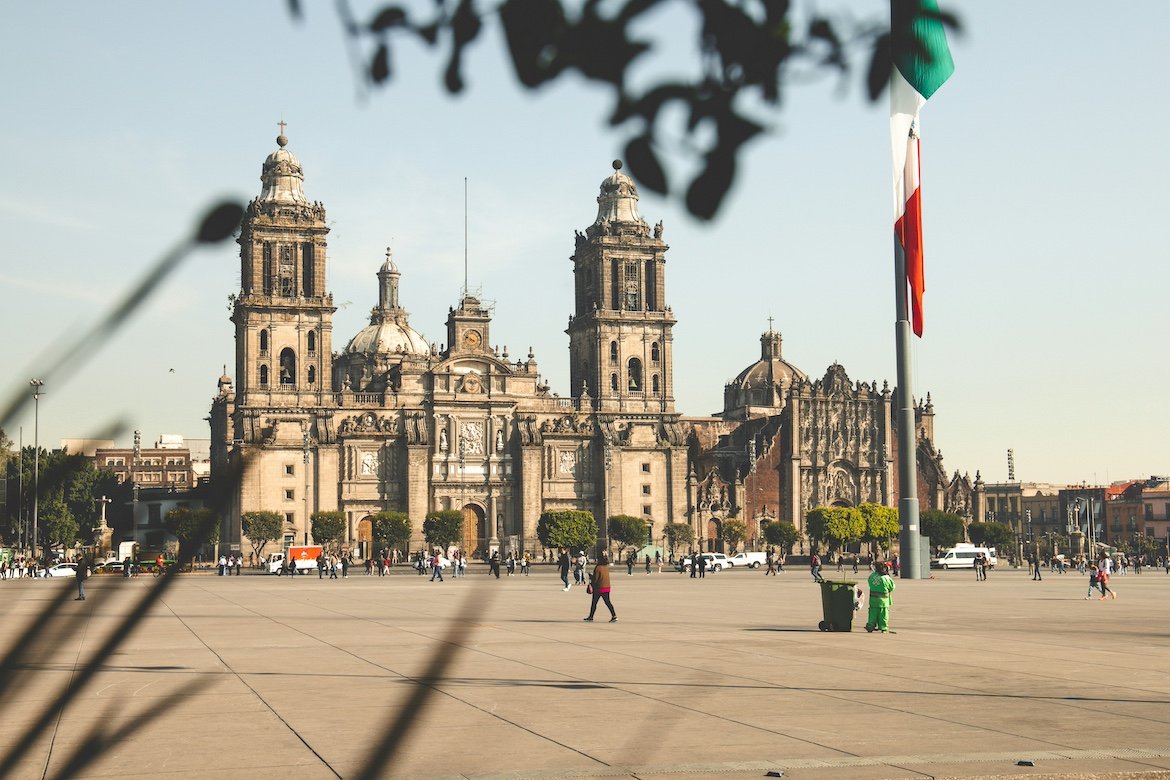
Discover Mexico City’s dynamic blend of ancient history, vibrant culture, and world-class gastronomy. Explore its iconic landmarks and unique energy with our comprehensive guide.
Welcome to Mexico City – a colossal and incredibly vibrant metropolis where ancient history meets modern art, and traditions harmoniously intertwine with the pulse of the twenty-first century.
This sprawling urban landscape is a kaleidoscope of colors, tastes, and sounds, offering a profound immersion into rich Mexican culture. Prepare for a captivating journey through one of the world’s most dynamic and historically significant cities.
Must See
Mexico City is a treasure trove of attractions, each telling a part of its millennia-old story. From ancient Aztec ruins to magnificent colonial palaces and contemporary architectural wonders, this section will guide you through the most iconic places you absolutely must see to feel the heart and soul of the city.
Zócalo (Plaza de la Constitución)
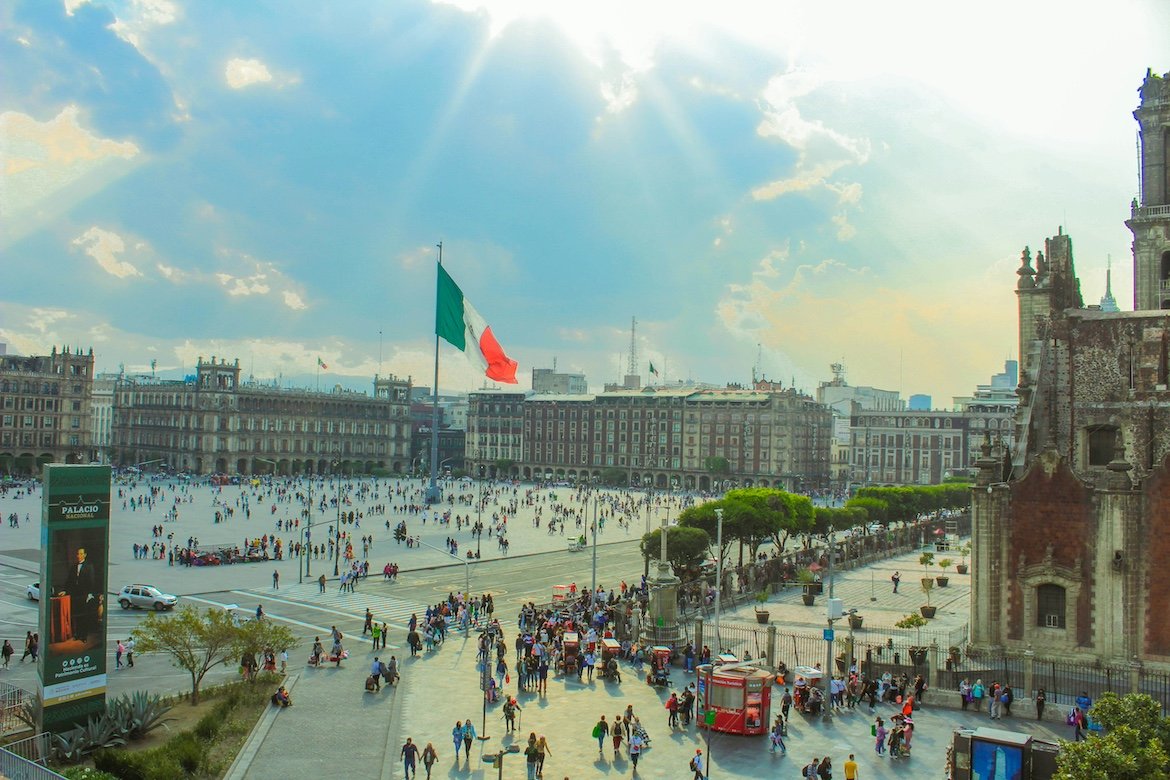
The Zócalo, officially Plaza de la Constitución, stands as the pulsating historical and cultural heart of Mexico City. It’s one of the largest city squares in the world, a vast open space that has served as a central gathering point for public events, celebrations, and protests for centuries, dating back to Aztec times when it was the ceremonial center of Tenochtitlan.
Surrounded by monumental buildings such as the majestic Metropolitan Cathedral, the historic National Palace, and the remains of the ancient Templo Mayor, the Zócalo offers a tangible connection to Mexico’s layered past. Witness its grandeur, observe the diverse daily life unfold, from street performers to indigenous dancers, and simply soak in the palpable energy and history of this iconic plaza.
Metropolitan Cathedral (Catedral Metropolitana)
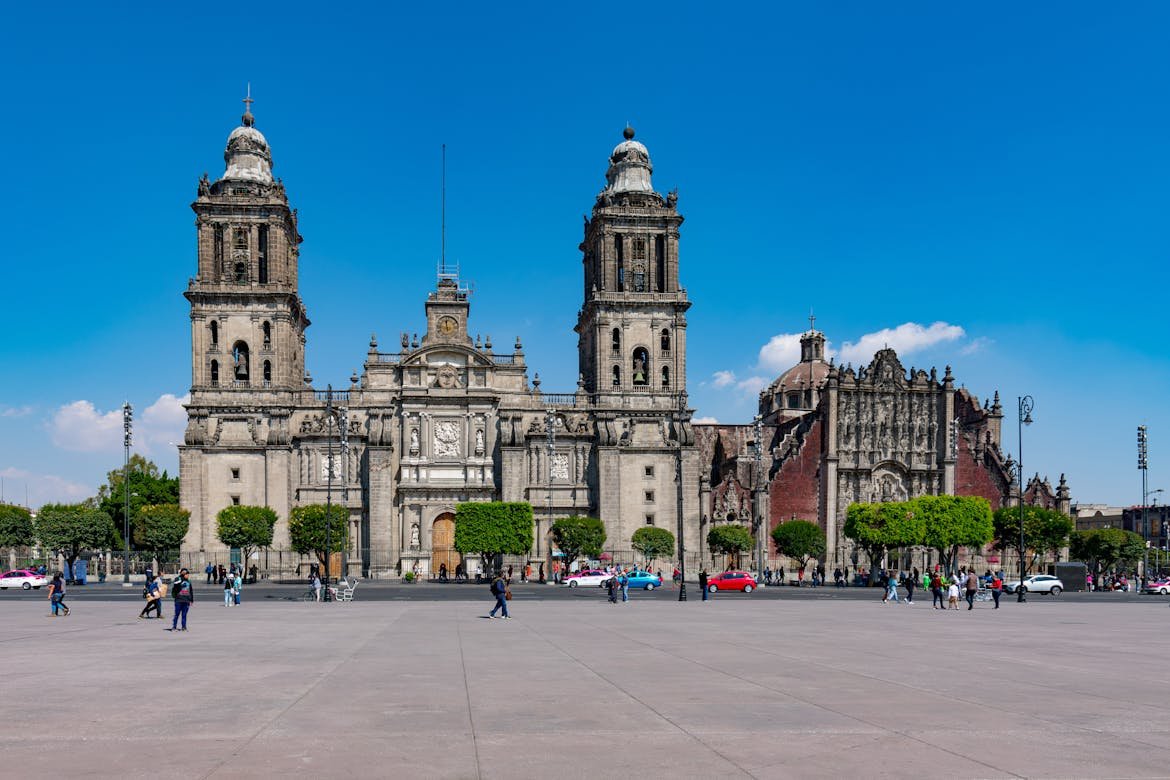
Standing majestically on the Zócalo, the Metropolitan Cathedral is not only the largest and oldest cathedral in Latin America but also a remarkable testament to centuries of architectural evolution. Its construction began shortly after the Spanish conquest in the 16th century and spanned nearly 250 years, resulting in a fascinating blend of architectural styles, including Baroque, Neoclassical, and Churrigueresque.
Inside, visitors can explore its opulent altars, over 16 intricate chapels, and a vast collection of sacred art. Be sure to look for the famous leaning facade, a striking visual reminder of the city’s unique challenge of sinking into its ancient lakebed, and perhaps even take a guided tour to climb to the bell towers for unique views.
Find info here.
Templo Mayor
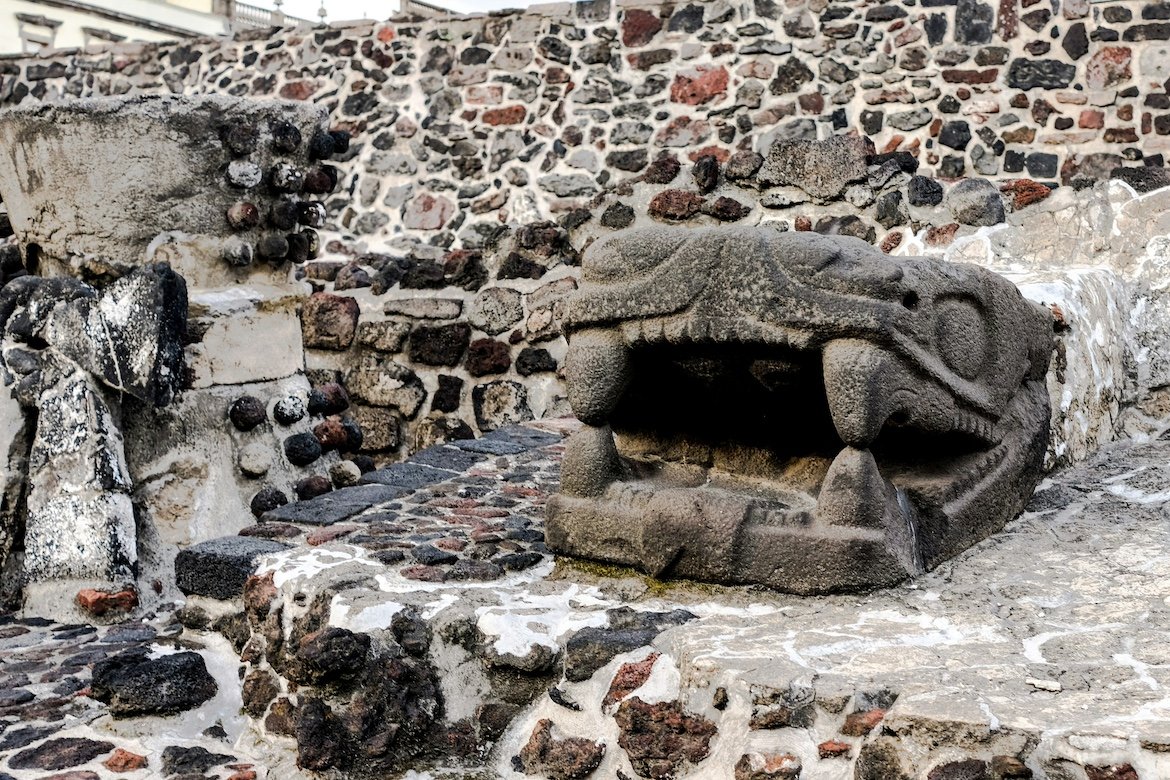
Just steps from the Metropolitan Cathedral, the Templo Mayor offers an incredibly compelling and tangible glimpse into Mexico City’s ancient past. These are the excavated ruins of the main temple of Tenochtitlan, the capital of the mighty Aztec empire, once believed to be the sacred center of their universe.
Discovered surprisingly recently in 1978 during subway construction, the site continues to reveal fascinating layers of history, as the Aztecs built successive temples on top of previous ones.
Explore the remains of structures dedicated to Huitzilopochtli (god of war and sun) and Tlaloc (god of rain and fertility), and then visit the exceptional adjacent museum. It showcases thousands of recovered artifacts, including jade masks, sacrificial knives, and giant stone sculptures like the famous Coyolxauhqui monolith, providing profound insights into Aztec cosmology and daily life.
Find info here.
Palacio Nacional (National Palace)
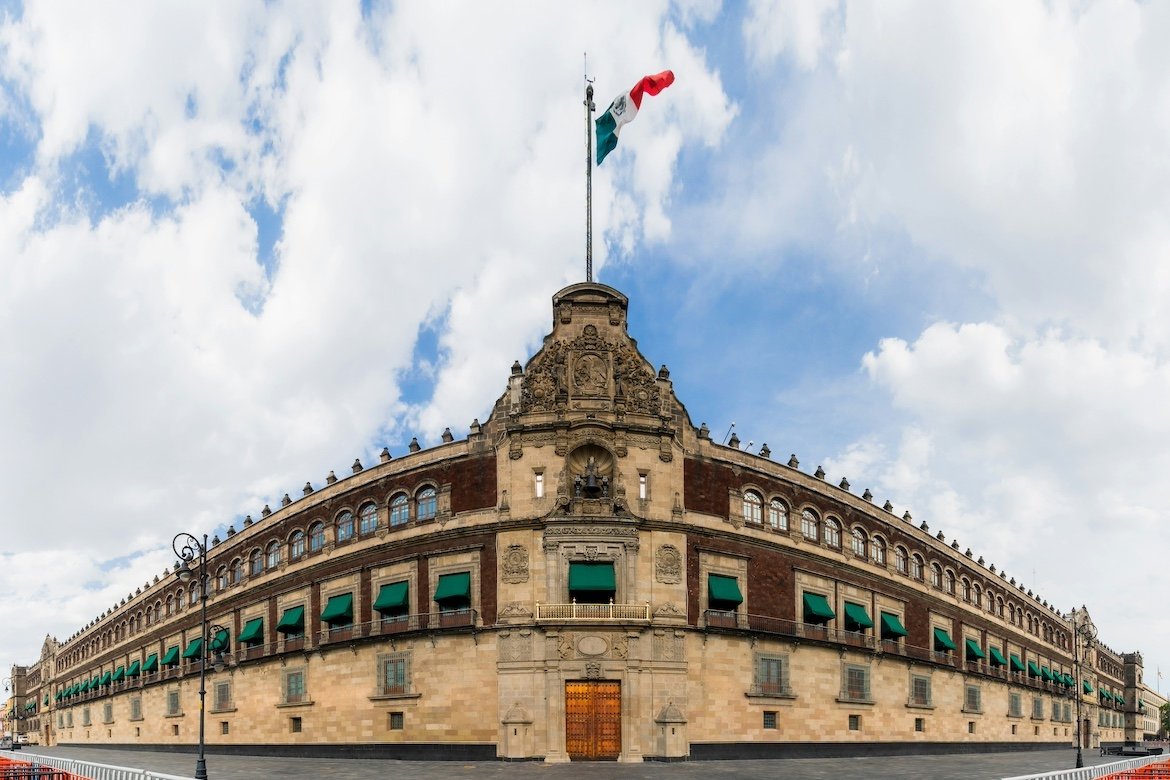
Dominating the entire eastern side of the Zócalo, the Palacio Nacional is not only the official residence and workplace of Mexico’s President but also a site steeped in centuries of Mexican history. Built on the site of Moctezuma II’s former palace, this impressive colonial building has witnessed countless pivotal moments in the nation’s past. While access to all areas might be restricted, its main draw for visitors are the awe-inspiring murals by the legendary Mexican artist Diego Rivera.
These epic frescoes, painted across the central stairwell and courtyards, depict Mexico’s entire history, from pre-Hispanic civilizations and the Spanish conquest to the struggles for independence and the post-revolutionary era, offering a powerful and visually stunning narrative of the nation’s identity, triumphs, and profound transformations.
Find info here.
Palacio de Bellas Artes (Palace of Fine Arts)
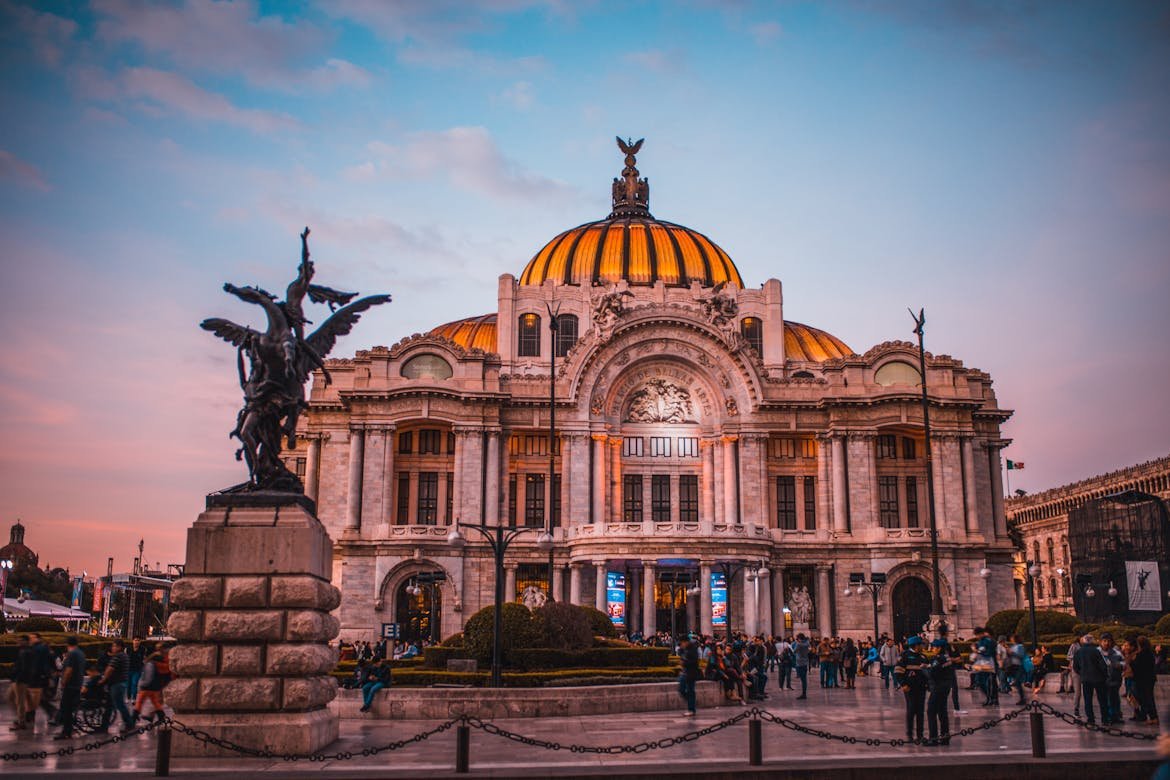
The Palacio de Bellas Artes is an undisputed architectural masterpiece and Mexico City’s most iconic cultural landmark. Its striking design, a luxurious blend of Art Nouveau and Art Deco styles, makes it a visual spectacle both inside and out, characterized by its stunning Carrara marble facade. Beyond its aesthetic appeal, it serves as the premier cultural venue in the country, housing murals by renowned Mexican artists such as Diego Rivera, David Alfaro Siqueiros, and Rufino Tamayo.
The palace also features a magnificent theater known for its Tiffany glass curtain, which hosts prestigious performances ranging from classical ballet (like the world-famous Ballet Folklórico de México) to opera and symphonic concerts. Even if you don’t attend a show, admiring its grand exterior and exploring its interior halls is an absolute must for art and architecture enthusiasts.
Find info here.
Chapultepec Park & Chapultepec Castle (Bosque de Chapultepec y Castillo de Chapultepec)
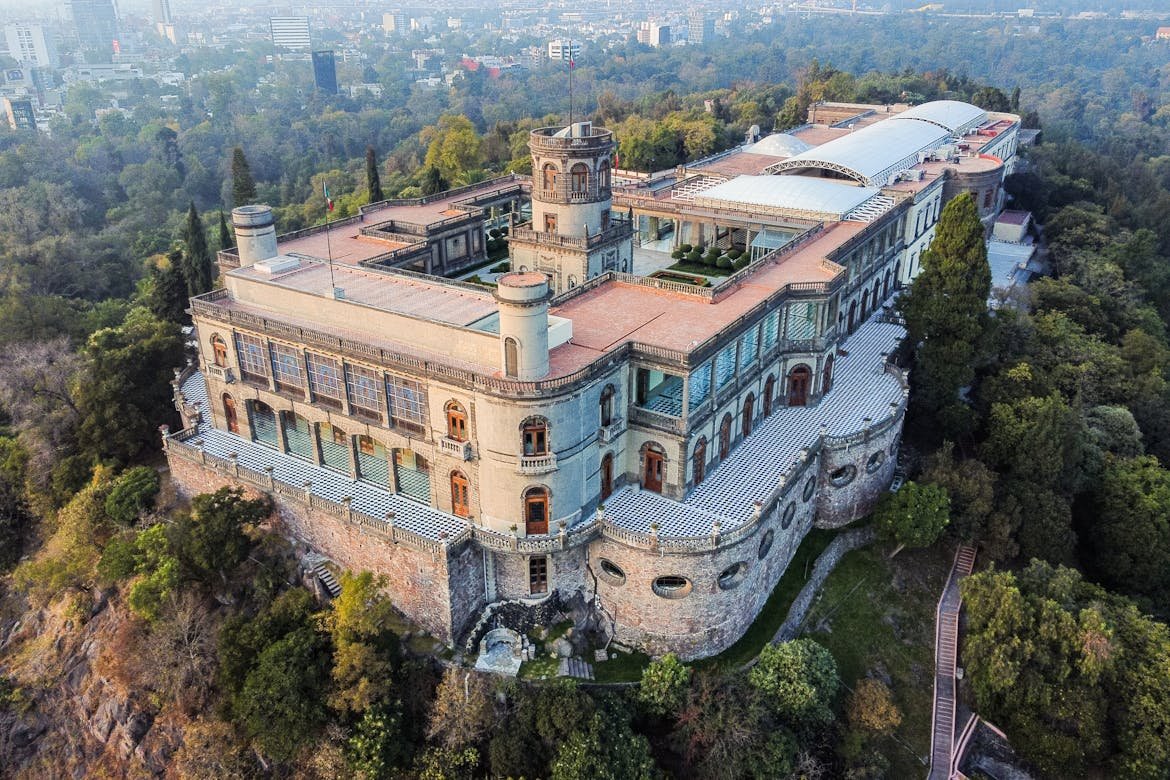
Chapultepec Park (Bosque de Chapultepec) is not merely a park, it’s a sprawling urban forest and one of the largest city parks in the Western Hemisphere, offering a vital green lung for Mexico City. This immense natural and cultural space is home to numerous attractions, making it a full-day destination in itself.
Dominating a hilltop within its vast grounds sits Chapultepec Castle (Castillo de Chapultepec), the only royal castle in North America, which once served as the imperial residence of Emperor Maximilian I and later as the presidential residence.
Today, it houses the National Museum of History, offering incredible panoramic views of the city. The park also encompasses several other world-class museums (like the National Museum of Anthropology), a zoo, botanical gardens, and various recreational areas, making it a perfect spot for relaxation, cultural immersion, and outdoor activities for all ages.
Find info on the Castle here.
Coyoacán (Neighborhood)
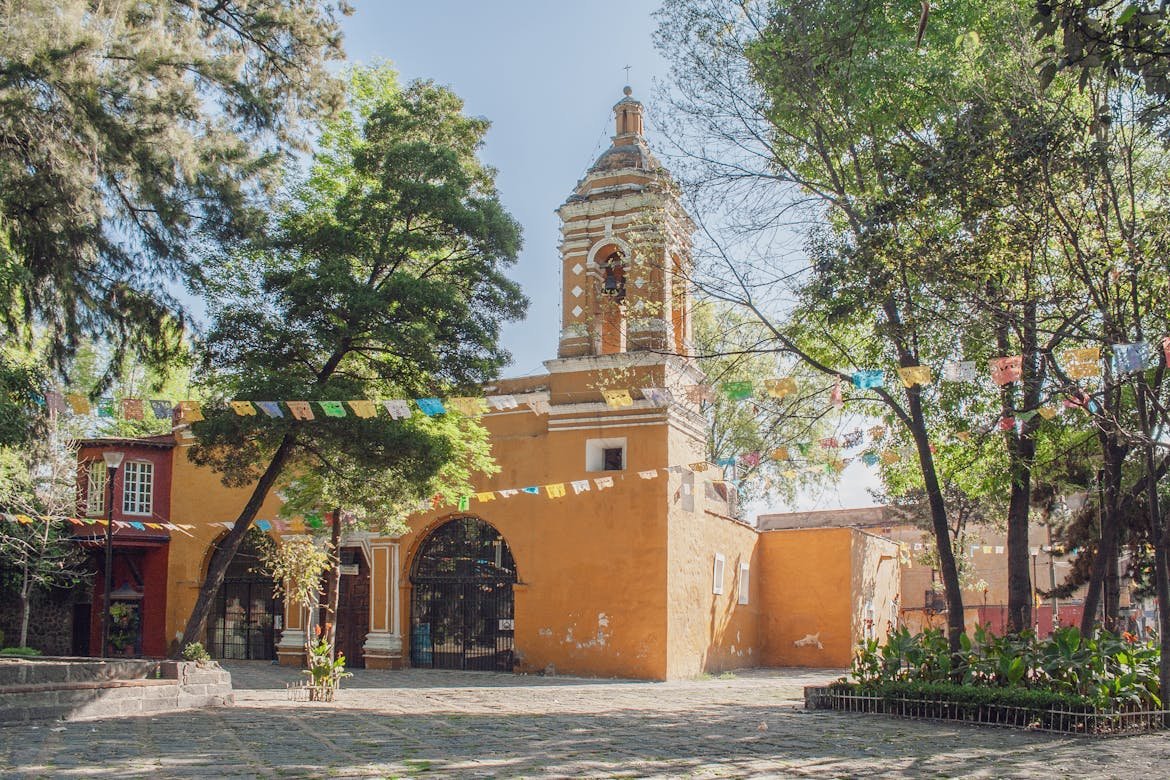
Escape the urban bustle by visiting Coyoacán, a charming, bohemian, and historically rich neighborhood that feels like a tranquil village within the sprawling city. Known for its cobblestone streets, vibrant colonial architecture, and two lively main plazas (Jardín Centenario and Plaza Hidalgo), Coyoacán offers a delightful contrast to the city center’s grand scale.
It was once home to famous artists like Frida Kahlo and Diego Rivera, whose presence is still strongly felt (especially at the Casa Azul museum). Spend your time leisurely strolling through its tree-lined avenues, Browse artisan markets, enjoying street performances, and savoring delicious food from its many cozy cafes and restaurants. It’s a perfect place to experience a relaxed, artistic, and deeply authentic side of Mexico City.
Xochimilco
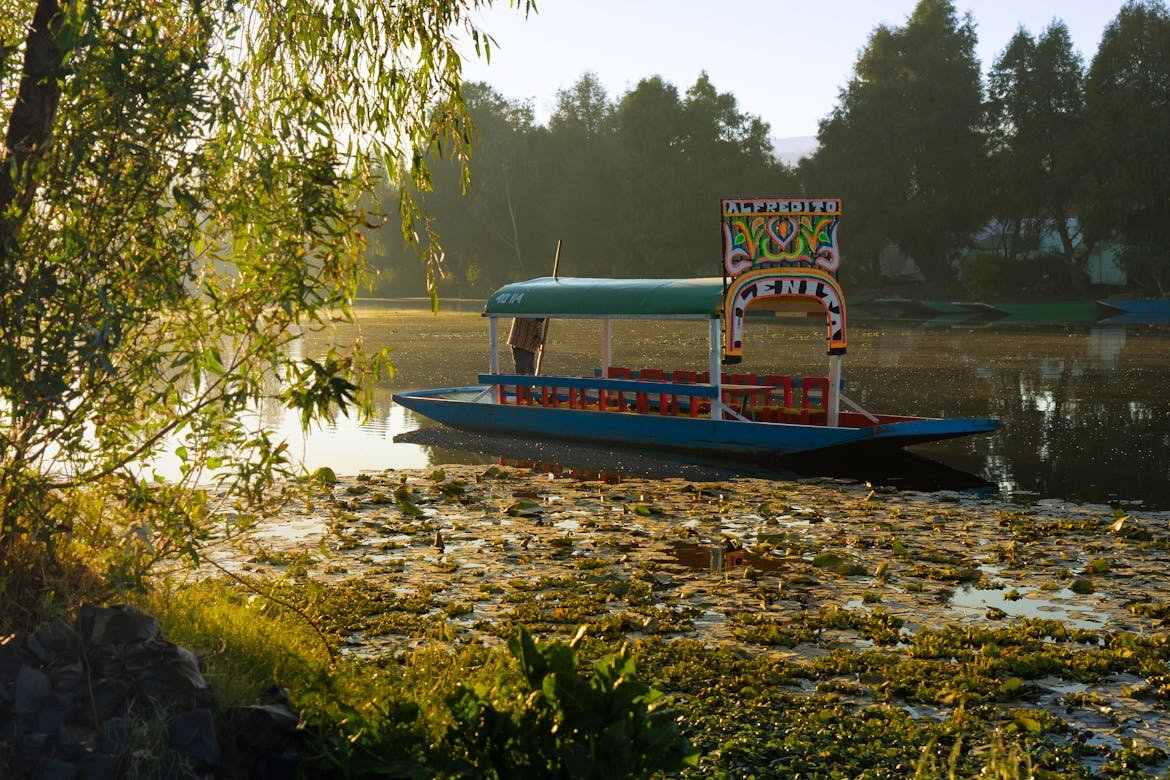
Embark on a truly unique and unforgettable journey through Xochimilco’s ancient canals, a UNESCO World Heritage site and one of the last remaining remnants of Mexico City’s vast Aztec lake system. Here, you can rent a brightly painted trajinera (traditional flat-bottomed boat) and float along the intricate network of waterways, often accompanied by mariachi bands playing on other boats.
Enjoy the festive atmosphere with friends and family, indulging in traditional food and drinks sold by vendors paddling alongside. It’s a lively, colorful, and culturally immersive experience, especially vibrant on weekends, offering a fascinating glimpse into a historical way of life that predates the modern metropolis.
Paseo de la Reforma
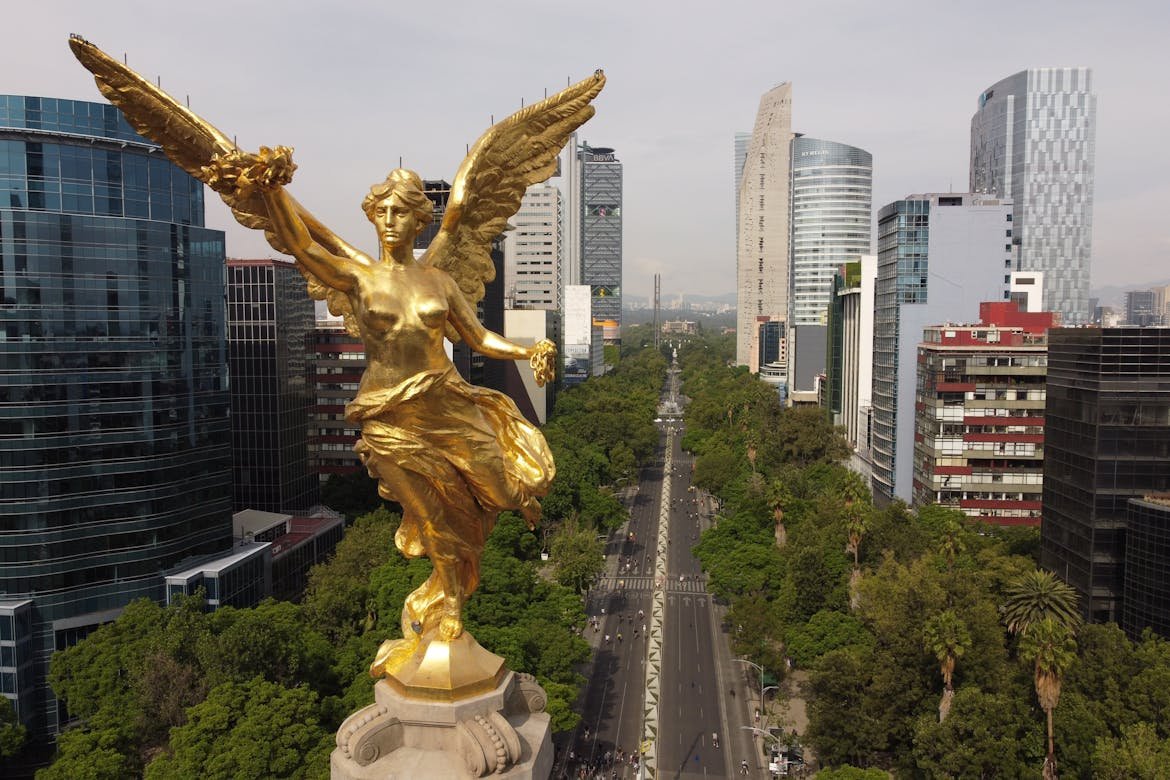
Paseo de la Reforma is Mexico City’s grandest and most iconic boulevard, often likened to the Champs-Élysées or Fifth Avenue. Designed in the 19th century by Emperor Maximilian I, it’s a wide, tree-lined avenue that cuts diagonally through the city, connecting key districts and showcasing a blend of historical grandeur and modern dynamism.
It’s adorned with numerous impressive monuments, most notably the towering Angel of Independence, alongside statues of national heroes and gleaming skyscrapers. Strolling along its wide sidewalks provides an excellent opportunity to admire its diverse architecture, observe the city’s vibrant daily life, and truly experience the cosmopolitan pulse of Mexico City. It’s a must for both history buffs and those who appreciate urban design.
Basílica de Guadalupe
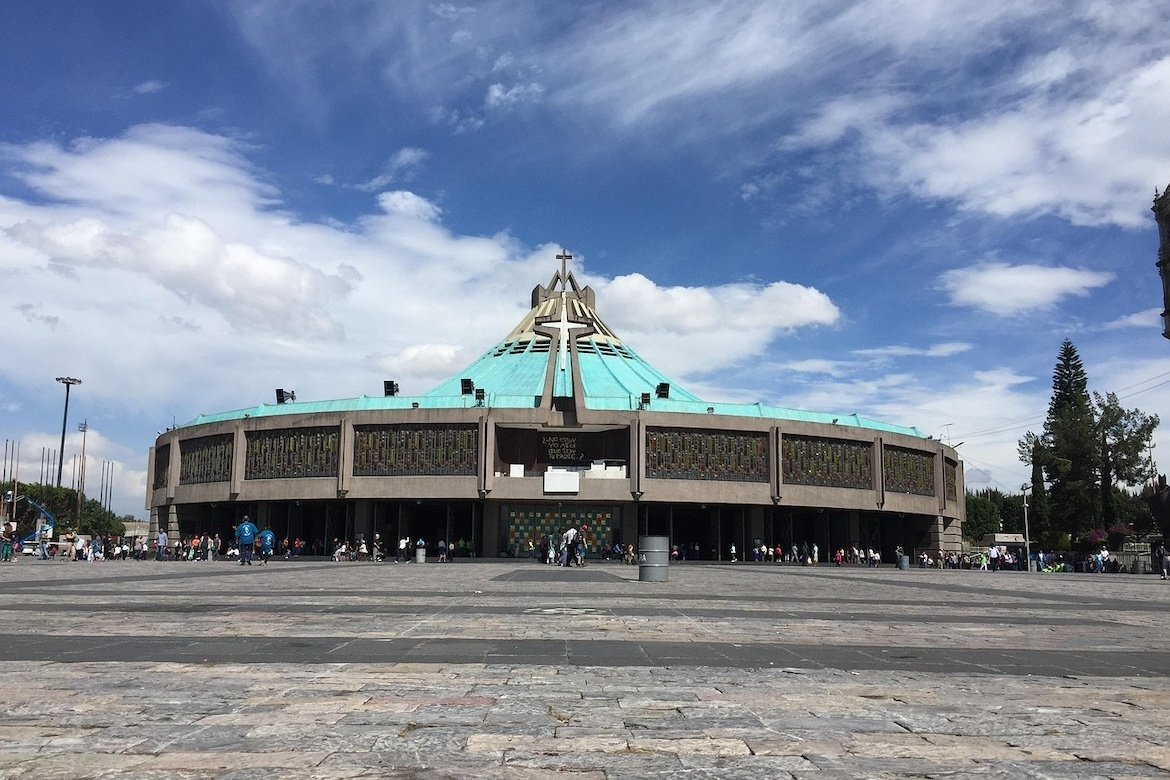
The Basílica de Guadalupe is not just a church; it’s one of the most important Catholic pilgrimage sites in the world, attracting millions of faithful and curious visitors annually. The complex is deeply sacred to Mexicans, housing the original cloak bearing the image of the Virgin of Guadalupe, believed to have miraculously appeared to Juan Diego in 1531.
The site features both the historic Old Basilica, which is notably sinking due to the city’s unstable ground, and the impressive, ultra-modern New Basilica, designed by Pedro Ramírez Vázquez to accommodate enormous crowds. Visiting offers a profound insight into Mexican spirituality, art, and the enduring power of faith.
Find info here.
Museums & Art
Mexico City boasts an exceptional array of museums and art galleries, reflecting its deep historical roots and dynamic contemporary scene. From pre-Hispanic civilizations to world-renowned modern art, the city offers cultural institutions that cater to every interest. Prepare to be captivated by Mexico’s rich artistic expressions.
National Museum of Anthropology (Museo Nacional de Antropología)
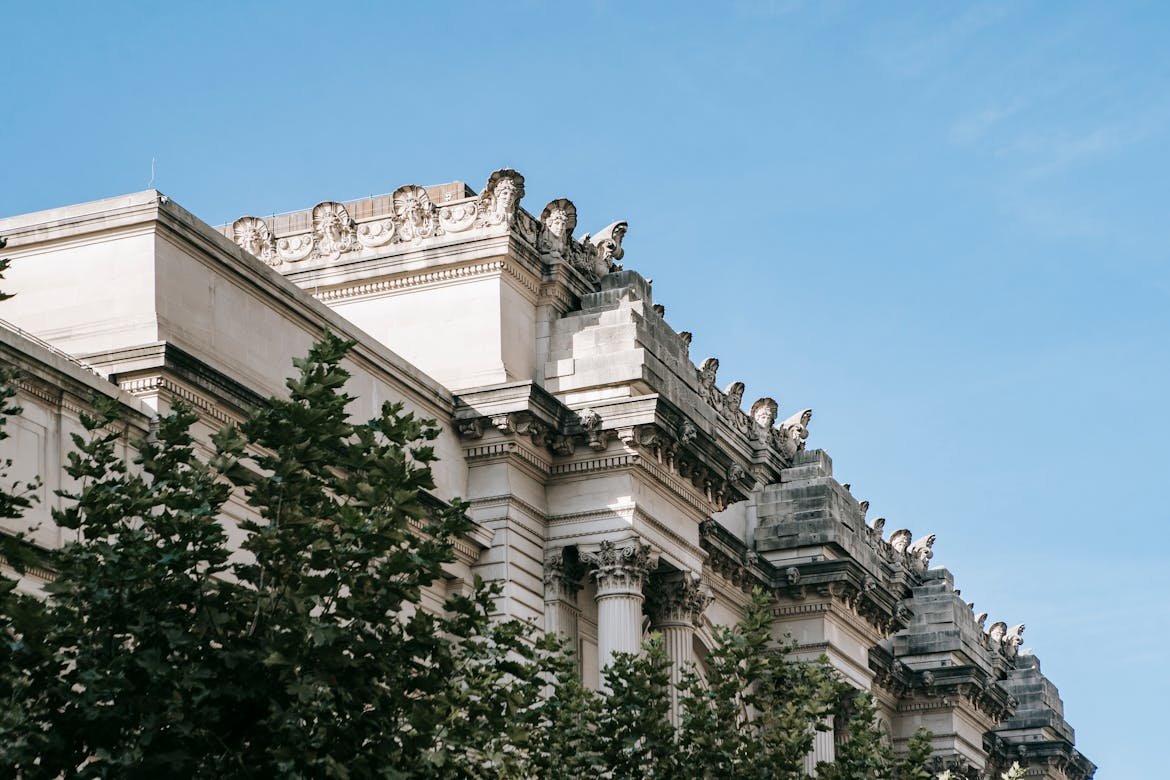
The National Museum of Anthropology (Museo Nacional de Antropología) is widely considered one of the best museums globally. It houses an unparalleled collection of artifacts from Mexico’s pre-Hispanic cultures, including Aztec, Mayan, and Olmec civilizations.
Highlights include the massive Aztec Sun Stone and vast halls dedicated to indigenous groups. This museum offers an immersive journey through Mexico’s rich archaeological past.
Find info here.
Frida Kahlo Museum (Casa Azul)

Step into the vibrant world of one of Mexico’s most iconic artists at the Frida Kahlo Museum (Casa Azul), in charming Coyoacán. This striking blue house was Frida Kahlo’s birthplace, home, and where she died, offering an intimate glimpse into her life and art. The museum displays her personal belongings and artwork within the colorful environment that inspired her. Book tickets well in advance due to its immense popularity.
Find info here.
Soumaya Museum (Museo Soumaya)
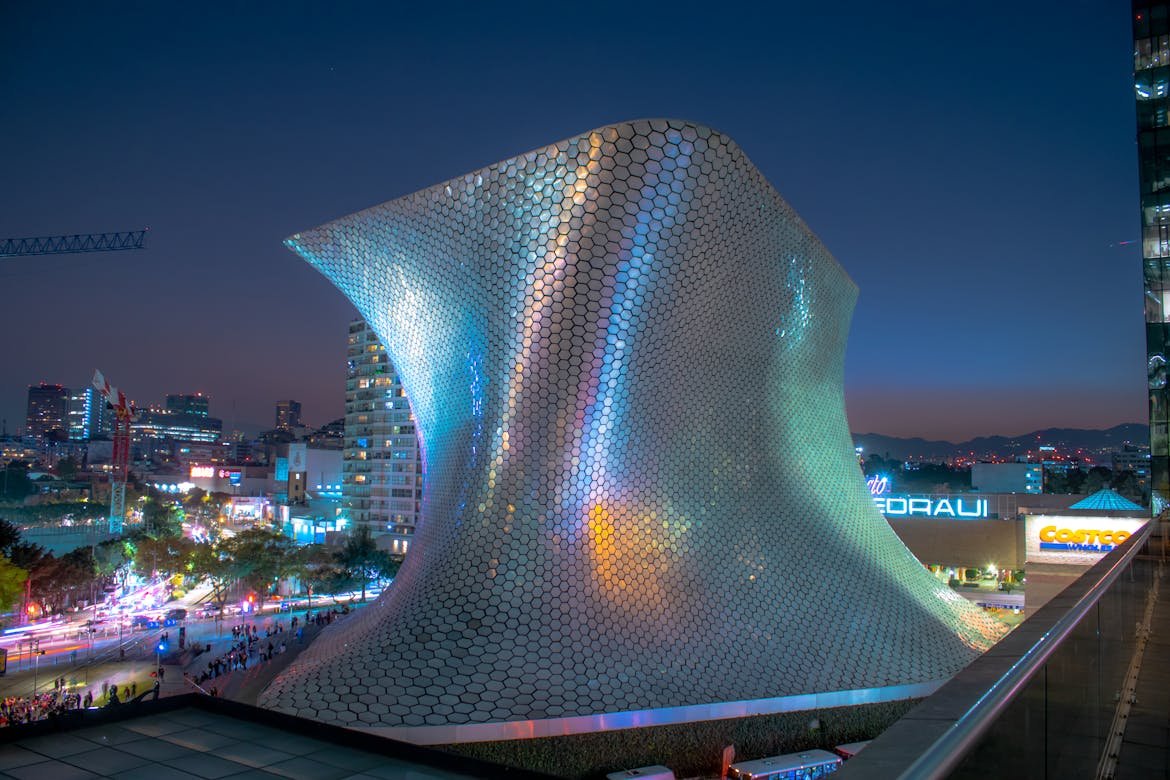
The Soumaya Museum (Museo Soumaya) is instantly recognizable by its dazzling, curvilinear silver façade, making it an architectural marvel. Located in Polanco, this privately-owned museum boasts a vast collection of over 66,000 works spanning 30 centuries. Highlights include European old masters, Mexican art, and the world’s largest private collection of Rodin sculptures outside of France. Admission is free, making it an accessible cultural gem.
Find info here.
Museo Jumex
Adjacent to the Soumaya Museum, Museo Jumex is Mexico’s largest private collection of contemporary art. Housed in a striking, minimalist building, the museum presents a diverse array of international and Mexican contemporary art. Its rotating exhibitions feature cutting-edge works, offering a thought-provoking experience for enthusiasts. It’s a must-visit for those interested in the current art world.
Find info here.
Museo Dolores Olmedo
The Museo Dolores Olmedo offers a unique artistic experience within a beautiful 16th-century hacienda in the Xochimilco area. It’s renowned for its extensive collection of works by Frida Kahlo and Diego Rivera. Beyond the art, the sprawling grounds are home to peacocks and fascinating hairless Xoloitzcuintli dogs. It provides a tranquil escape and a deeper insight into these iconic artists.
Find info here.
What to Do
Mexico City offers an endless array of activities, blending traditional experiences with modern urban adventures. Beyond its iconic landmarks and world-class museums, the city invites you to immerse yourself in its vibrant culture, savor its diverse gastronomy, and discover unique entertainment. Get ready to experience the energetic pulse and rich traditions of this incredible metropolis.
Take a Day Trip to Teotihuacan
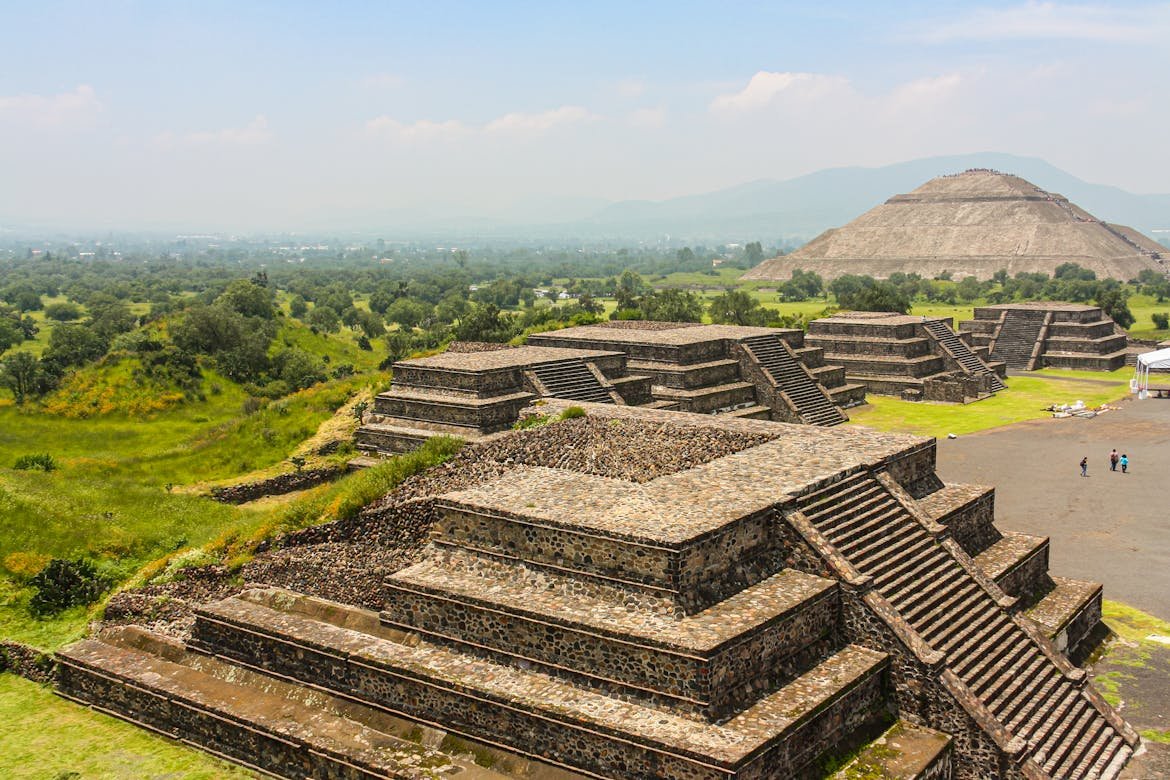
Venture just an hour outside the city to explore the awe-inspiring ancient city of Teotihuacan. This UNESCO World Heritage site was once one of the largest cities in the ancient world, featuring massive pyramids like the Pyramid of the Sun and the Pyramid of the Moon, and the Avenue of the Dead.
Climb the pyramids for breathtaking views and ponder the mysteries of this powerful pre-Aztec civilization. It’s an unforgettable journey into Mexico’s profound historical past.
Find info here.
Experience Lucha Libre
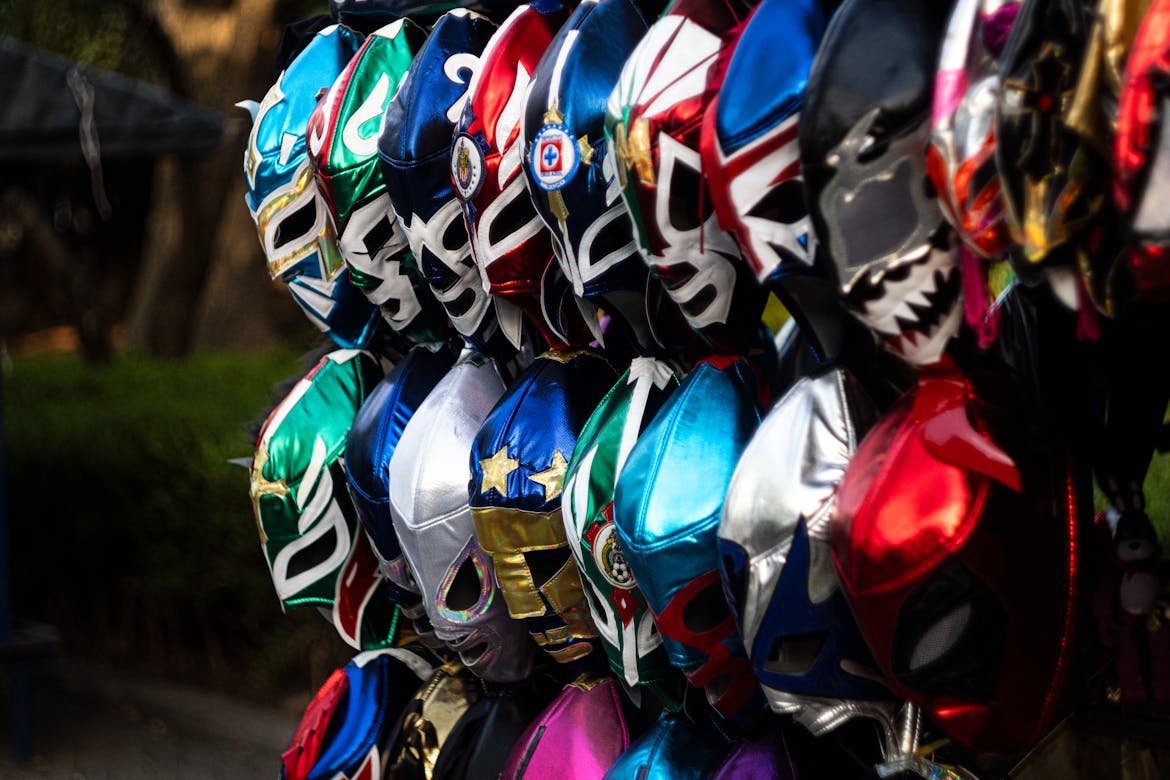
Dive into the exhilarating world of Lucha Libre, Mexico’s iconic professional wrestling. This high-energy spectacle is a theatrical blend of sport and entertainment, featuring masked wrestlers (luchadores) performing acrobatic moves, elaborate costumes, and dramatic storylines.
Attend a match at Arena México for an electrifying atmosphere, complete with cheering crowds, colorful characters, and a true taste of Mexican popular culture. It’s an unforgettable night out that’s full of fun.
Find info here.
Explore Mercado de San Juan
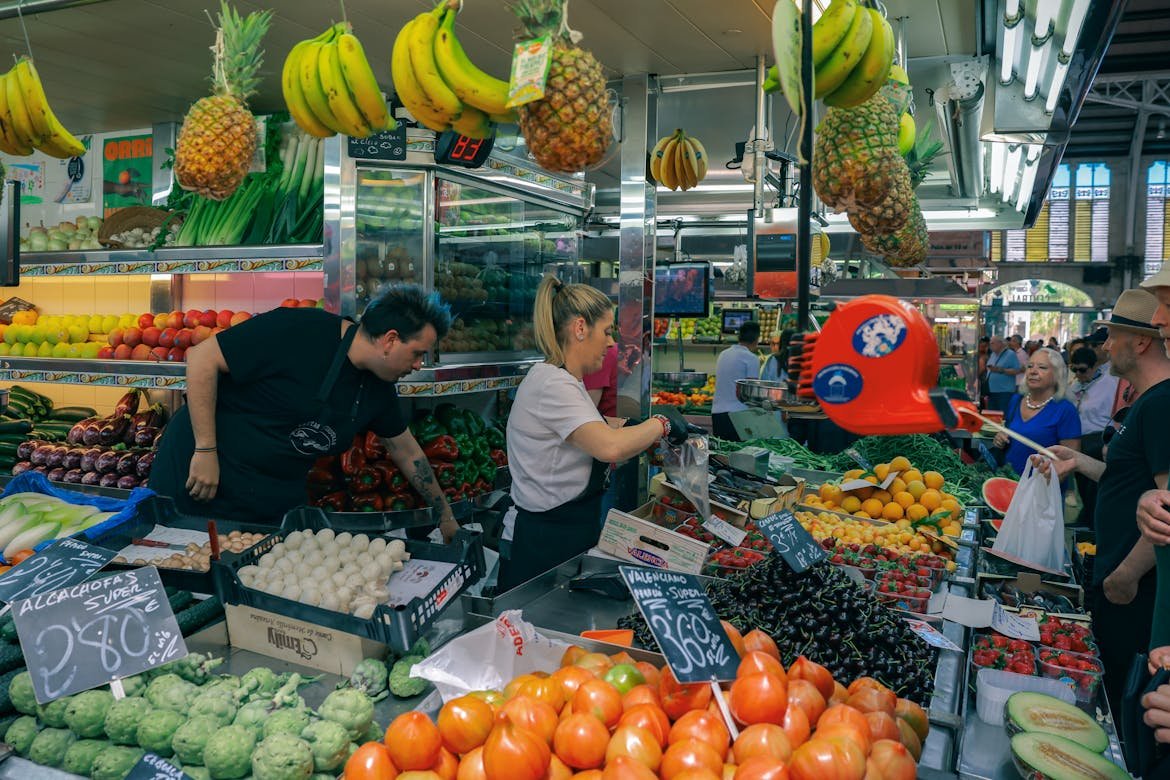
For a unique culinary adventure, visit Mercado de San Juan, a specialized market unlike any other. While it offers conventional meats and produce, it’s famous for its exotic and gourmet offerings, including wild game like deer, boar, crocodile, and even insects such as escamoles (ant larvae) and chapulines (grasshoppers).
It’s a fascinating place for adventurous foodies to sample unusual delicacies or simply to marvel at the diverse array of ingredients that form part of Mexico’s rich culinary landscape.
Enjoy Mariachi Music at Plaza Garibaldi
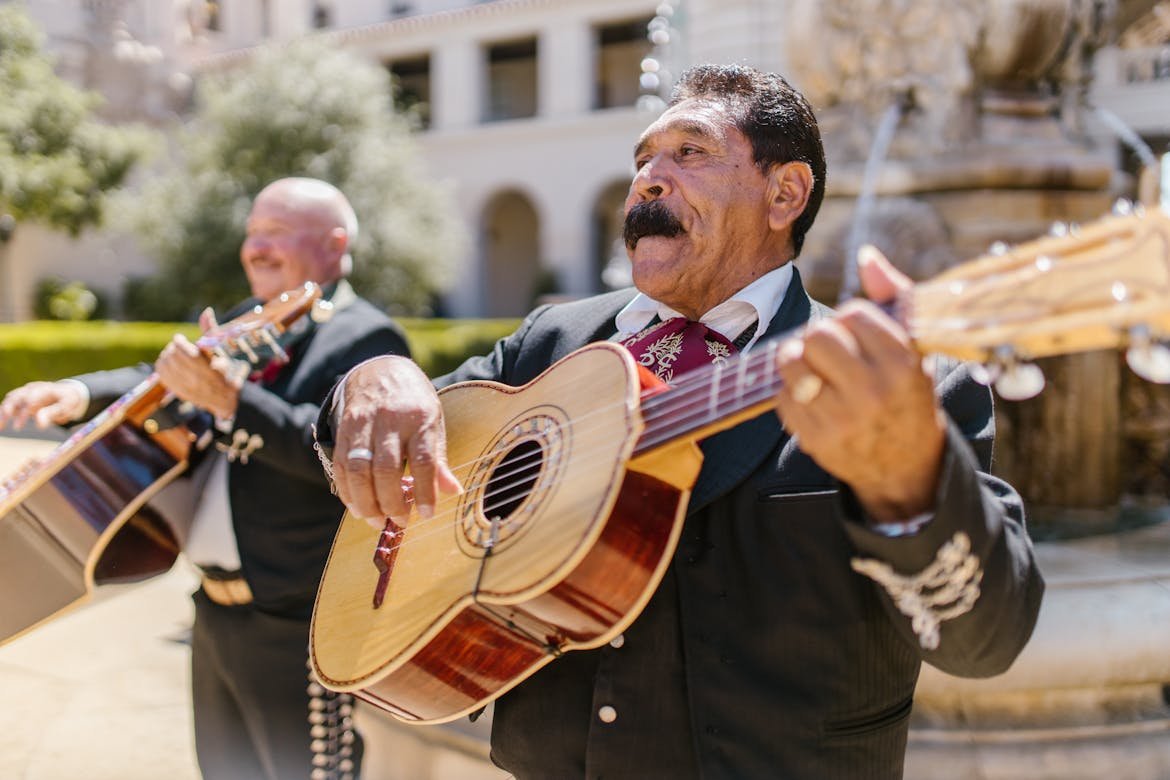
Immerse yourself in the soulful sounds of Mexico at Plaza Garibaldi, the traditional home of mariachi music. This lively square comes alive in the evenings as dozens of mariachi bands gather, ready to serenade visitors.
You can hire a band for a song or two, enjoy the atmosphere from one of the surrounding cantinas, or simply soak in the vibrant energy. It’s a quintessential Mexican experience, filled with passion, tradition, and unforgettable melodies.
Take a Mexican Cooking Class or Food Tour
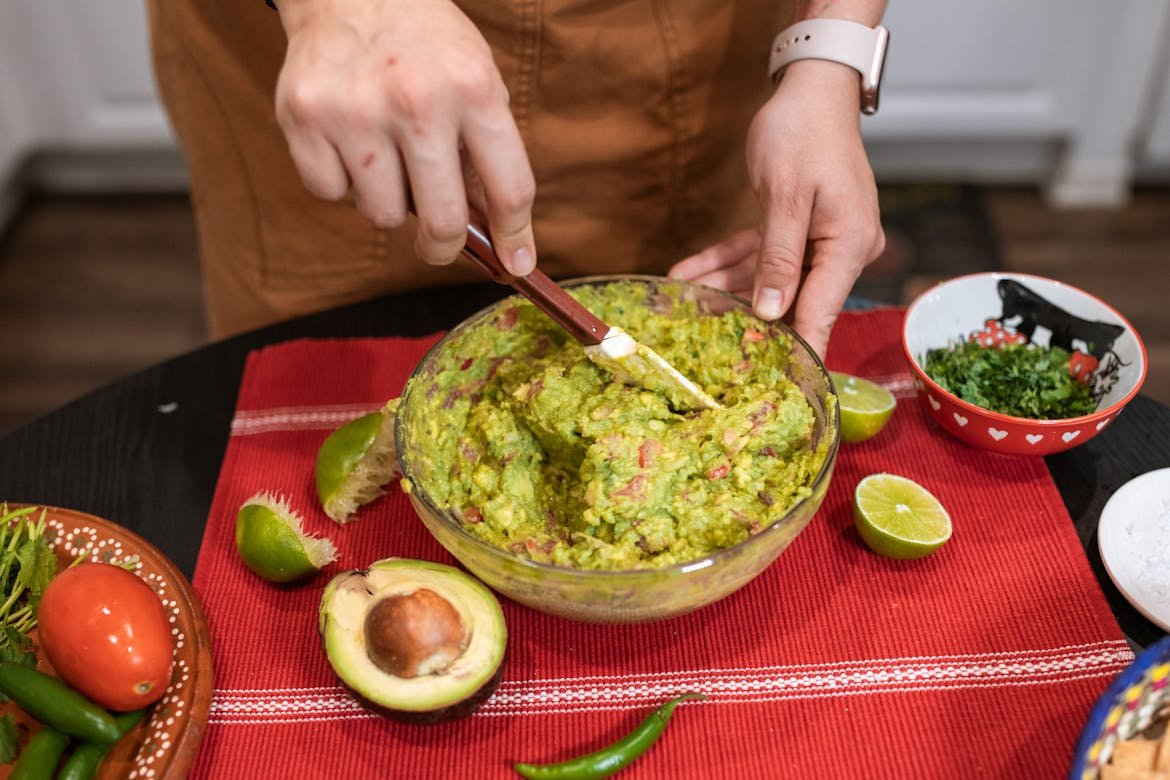
Delve deeper into Mexico’s celebrated culinary traditions by taking a cooking class or joining a food tour. Many local chefs offer hands-on classes where you can learn to prepare traditional dishes like tacos, mole, or tamales from scratch, often starting with a visit to a local market.
Alternatively, a food tour will guide you through hidden culinary gems, street food stands, and authentic eateries, offering tastings and insights into the diverse flavors of Mexican gastronomy. It’s a delicious way to connect with the local culture.
Find cooking class info here.
Stroll through Roma Norte & Condesa
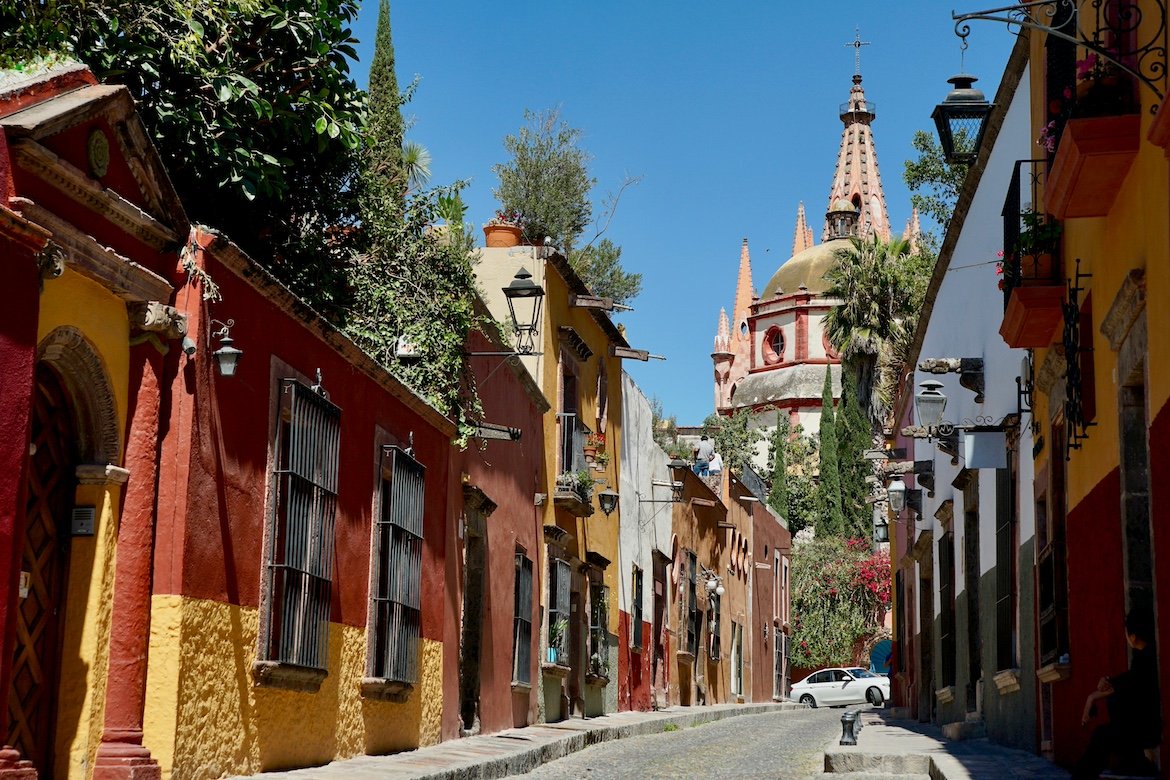
Spend an afternoon exploring the trendy and tree-lined neighborhoods of Roma Norte and Condesa. These adjacent districts are famous for their beautiful Art Deco architecture, independent boutiques, vibrant street art, and an abundance of stylish cafes, bars, and restaurants.
Perfect for leisurely walks, people-watching, and enjoying a more bohemian and contemporary side of Mexico City’s urban charm. Discover hidden plazas and enjoy the relaxed, yet sophisticated atmosphere.
Attend a Futbol (Soccer) Match at Estadio Azteca
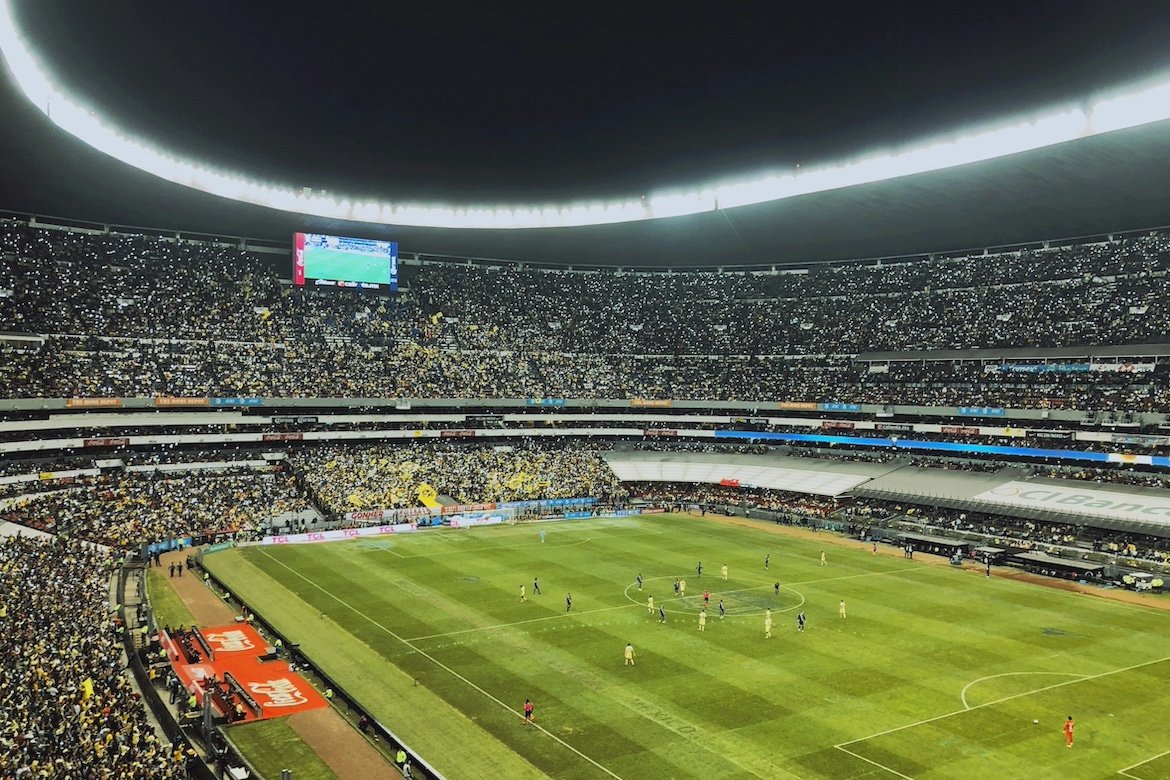
For sports enthusiasts, catching a futbol match at Estadio Azteca is an electrifying cultural experience. This legendary stadium, one of the largest in the world and host to two World Cup finals, is home to the famous Club América.
Feel the incredible passion of Mexican fans as they cheer for their teams, creating an unforgettable atmosphere of chants, flags, and pure excitement. It’s a truly immersive way to witness a vital part of Mexican national identity.
Find info here.
Where to Eat
Mexico City’s culinary scene is a vibrant tapestry woven from ancient traditions, innovative gastronomy, and an explosion of street food flavors. From Michelin-starred restaurants to bustling markets and iconic street stalls, the city offers an extraordinary array of gastronomic delights. Prepare to embark on a culinary journey that will excite every palate.
Popular Tourist Spots
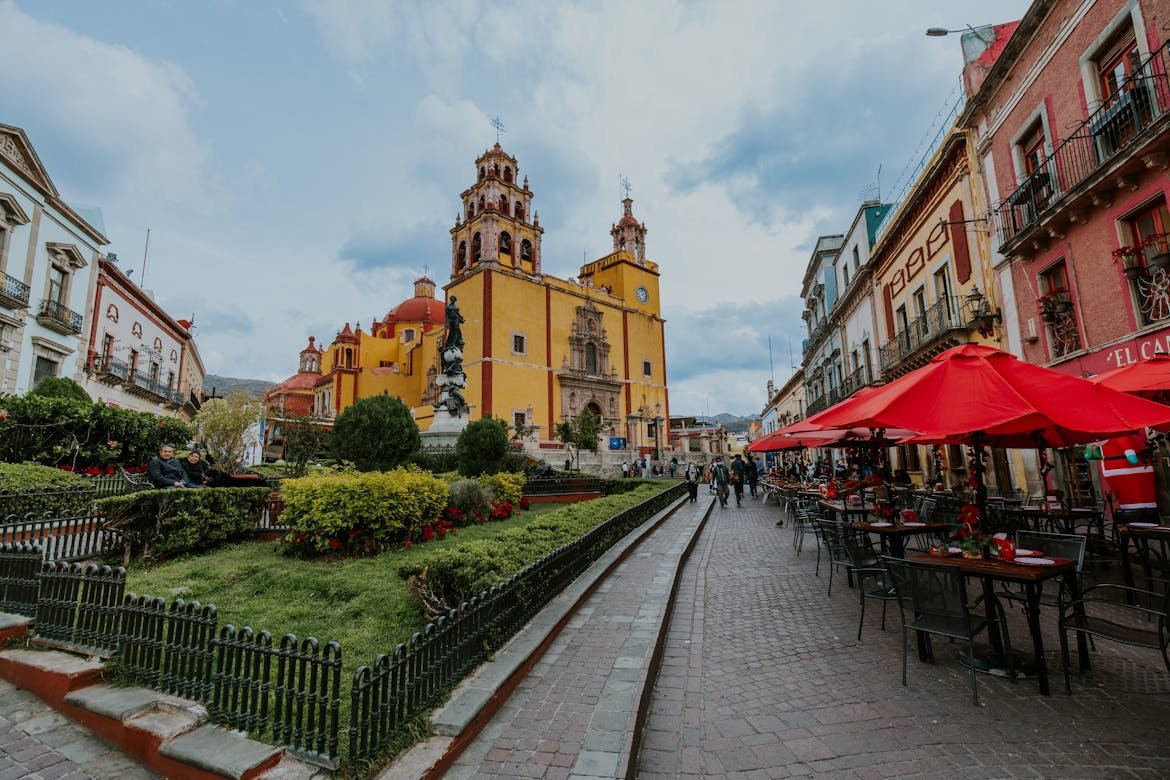
These establishments are widely recognized and frequently visited by travelers, offering excellent quality and a convenient introduction to some of Mexico’s most iconic dishes or popular dining concepts.
-
El Cardenal
A beloved institution for classic Mexican breakfast and lunch. El Cardenal is renowned for its traditional dishes like huevos rancheros, conchas (sweet bread), and rich mole. It offers an authentic, high-quality experience in a formal yet welcoming setting, perfect for starting your day or enjoying a traditional meal. -
Sanborns de los Azulejos
Housed in the stunning “House of Tiles,” Sanborns de los Azulejos is a historical landmark and a popular dining spot. Enjoy classic Mexican comfort food in an incredibly beautiful, tile-covered courtyard. It’s an atmospheric place for a meal or a coffee, offering a glimpse into the city’s elegant past. -
Contramar
A renowned seafood restaurant in Roma Norte, Contramar is famous for its fresh, vibrant dishes, particularly the iconic whole grilled red snapper (pescado a la talla) and tuna tostadas. It has a lively, upscale yet casual atmosphere, making it a favorite for both locals and visitors seeking exceptional seafood. -
Azul Histórico
Located in a beautiful 17th-century courtyard of a former palace, Azul Histórico offers traditional Mexican cuisine with a sophisticated touch. Their menu highlights regional specialties, often with a seasonal focus, served in a stunning, romantic setting under large trees. It’s perfect for a memorable dining experience. -
Churrería El Moro (Various locations)
An absolute icon of Mexico City, Churrería El Moro has been serving delicious churros and chocolate since 1935. This bustling, often 24/7, spot is perfect for a late-night snack, a sweet breakfast, or an afternoon treat. Enjoy freshly fried churros with a variety of dipping chocolates. -
Taquería El Califa (Various locations)
For a quintessential Mexico City taco experience, Taquería El Califa is a popular and reliable choice. Known for its high-quality ingredients and classic taco varieties like al pastor, arrachera, and costilla, it’s a go-to spot for locals and tourists alike seeking delicious, authentic tacos in a modern taquería setting.
Local Favorites
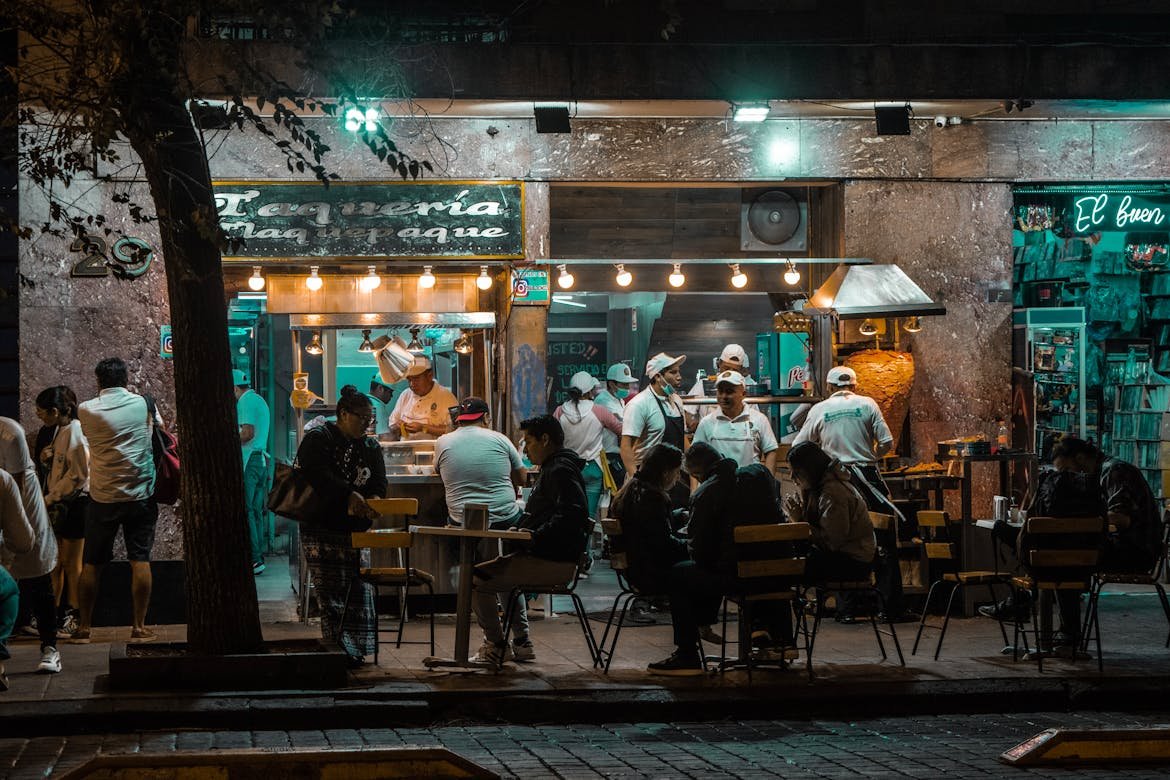
These spots are often frequented by locals and offer a genuine taste of Mexico City’s everyday culinary scene, providing authentic flavors or unique dining experiences away from the immediate tourist paths.
-
Rosetta
Set in a beautiful colonial mansion, Rosetta is celebrated for its exquisite modern Mexican cuisine with Italian influences. Chef Elena Reygadas creates sophisticated dishes using seasonal, local ingredients. It’s an elegant yet relaxed fine-dining experience, beloved by locals for its impeccable quality and atmosphere. -
Nicos
Nicos is a classic Mexican restaurant renowned for its commitment to traditional recipes and culinary heritage. It’s famous for dishes like sopa seca de fideo and its exquisite mole. Nicos offers a refined, yet authentic dining experience that showcases the depth and complexity of Mexican flavors, often with tableside preparations. -
Tacos Orinoco
A hugely popular spot known for its Northern Mexican-style tacos, Tacos Orinoco is a must-visit for casual, delicious eats. Their specialty is taco de chicharrón (fried pork skin), but all their simple, flavorful tacos are a hit. Expect lively crowds and a bustling, authentic taquería atmosphere. -
El Huequito (Various locations)
Often cited as having some of the best tacos al pastor in the city, El Huequito is a no-frills, beloved local spot. Their signature tacos al pastor are cooked on a vertical spit, served with pineapple, onion, and cilantro. It’s a quick, delicious, and quintessential Mexico City street food experience. -
Panadería Rosetta
The bakery arm of Rosetta restaurant, Panadería Rosetta is famous for its exceptional artisanal breads and pastries. Locals flock here for their legendary rol de guayaba (guava roll), croissants, and sourdough bread. It’s the perfect spot for a delicious breakfast, a quick coffee, or to pick up some treats. -
La Parnita
La Parnita is a vibrant and always-packed restaurant in Roma Norte, celebrated for its lively atmosphere and excellent tacos, tostadas, and quesadillas. While they offer a wide menu, their seafood options like shrimp tacos are particularly popular. It’s a great spot for a casual, authentic, and bustling Mexican meal. -
Máximo Bistrot
Máximo Bistrot is a celebrated farm-to-table restaurant focusing on modern Mexican cuisine with French influences. Chef Eduardo García prioritizes fresh, seasonal, and locally sourced ingredients, creating a refined yet approachable dining experience. It’s a favorite among locals for its innovative dishes and charming, intimate ambiance.
Cafés & Coffee Shops

Mexico City’s cafe culture is thriving, offering everything from historic grand cafes to minimalist specialty coffee shops, perfect for a break, a quick bite, or a delicious cup of local brew.
- Churrería El Moro (Various locations)
While primarily known for its churros, Churrería El Moro is also a classic spot for coffee and hot chocolate. Its bustling, nostalgic atmosphere makes it a perfect place for a traditional Mexican cafe experience. Grab a coffee and a fresh churro any time of day or night. - Café El Jarocho (Various locations)
A beloved institution in Coyoacán, Café El Jarocho is famous for its strong, traditional Mexican coffee. It’s a no-frills, authentic spot where locals often grab a quick coffee to go or enjoy a simple cup with a pastry. It’s a true taste of local cafe culture. - Café Tacuba
More than just a café, Café Tacuba is a historic restaurant founded in 1912, offering a grand, colonial atmosphere perfect for a leisurely coffee or meal. While serving full Mexican dishes, its old-world charm and traditional coffee make it a delightful spot for a break in the historic center. - Blend Station (Various locations)
A modern and stylish specialty coffee shop, Blend Station offers carefully selected and roasted beans. Known for its friendly baristas and comfortable ambiance, it’s a popular spot for remote work, catching up with friends, or simply enjoying a high-quality coffee. They offer various brewing methods for coffee aficionados. - Cicatriz
Cicatriz is a trendy and popular cafe in the Juárez neighborhood, known for its minimalist design, excellent coffee, and fresh, wholesome food options like sandwiches and salads. It has a hip, relaxed vibe and attracts a diverse crowd. It’s perfect for a casual breakfast, lunch, or a coffee break.M
How to Get Around
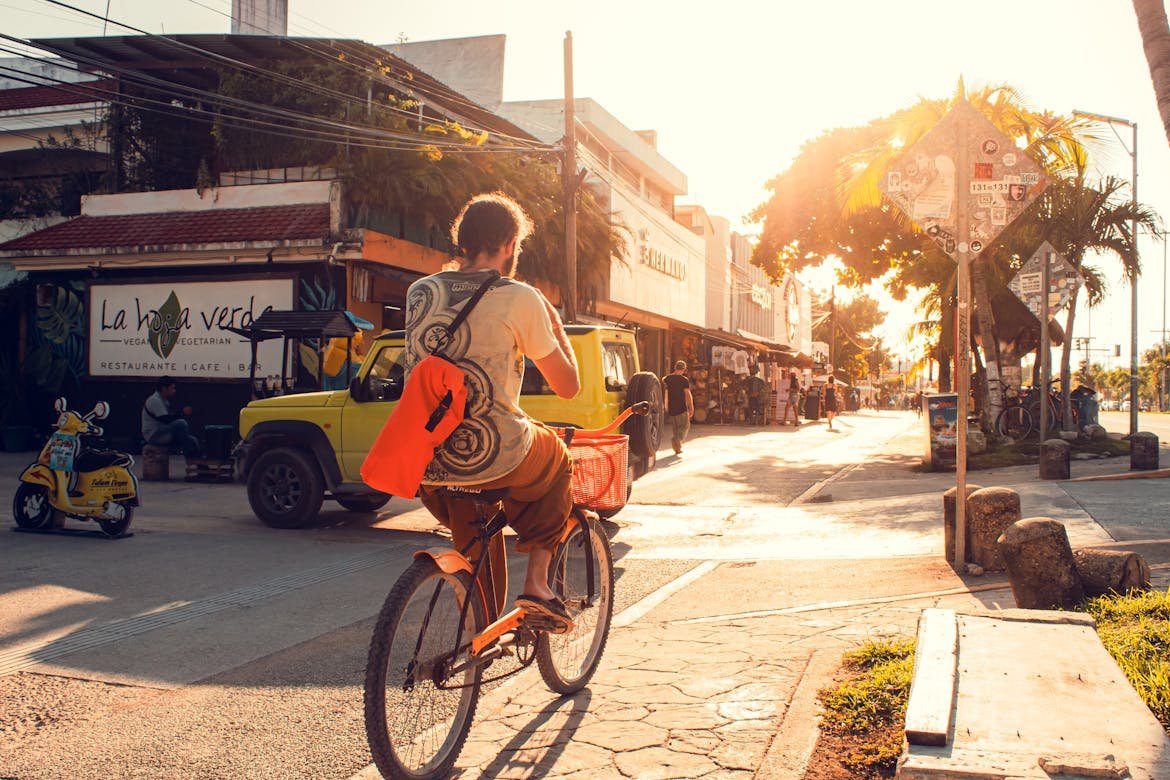
Navigating Mexico City, one of the world’s largest metropolises, can seem daunting at first, but the city offers a diverse and efficient public transport network that makes getting around surprisingly straightforward. From its extensive metro system to popular ride-sharing services, you’ll find numerous convenient ways to explore its vast and vibrant neighborhoods. Embrace the local pace and discover how accessible urban exploration can be here.
Integrated Mobility Card: Your Key to Public Transport
To use most of Mexico City’s public transport system, you’ll need the Integrated Mobility Card (Tarjeta de Movilidad Integrada). This rechargeable card can be purchased and topped up at Metro stations, Metrobus stations, and some convenience stores. It’s essential for accessing the Metro, Metrobus, Cablebús, and Tren Ligero, simplifying your journeys and often offering better value than single-use tickets where available.
Public Transport Network: Metro, Metrobus, and More
Mexico City boasts a comprehensive and affordable public transport system:
-
Metro: The Metro is the fastest and most widely used form of public transport. With 12 lines covering most of the city, it’s incredibly efficient for navigating long distances, though it can get extremely crowded during peak hours (especially on weekdays mornings and evenings). Look for designated “women and children only” cars during busy times.
-
Metrobus: The Metrobus is a Bus Rapid Transit (BRT) system that operates on dedicated lanes, making it a reliable option for surface travel. It covers major avenues and connects well with the Metro system. It’s often less crowded than the Metro and offers a chance to see more of the city above ground.
-
Cablebús: A newer addition, the Cablebús is a modern cable car system offering breathtaking panoramic views of the city, particularly useful for reaching areas in the northern and eastern parts of the city that are built on hills. It’s a clean, safe, and scenic way to travel, especially for tourists looking for unique perspectives.
-
Tren Ligero: The Tren Ligero (Light Rail) is a single line that primarily serves the southern part of the city, connecting Tasqueña Metro station to Xochimilco. It’s the most convenient way to reach the famous Xochimilco canals from the city center.
Ride-Sharing Services: Convenient and Affordable
Ride-sharing apps like Uber, Didi, and Cabify are extremely popular in Mexico City and often the preferred method for tourists due to their convenience, transparency, and affordability compared to street taxis.
They offer a safe and reliable way to travel, especially at night or when carrying luggage. Simply download the app, enter your destination, and your ride will be promptly dispatched.
Taxis & Walking
- Taxis: While traditional taxis (pink and white or newer designated colors) are abundant, it’s generally recommended to use ride-sharing apps for safety and fare transparency. If hailing a street taxi, try to choose official “sitio” taxis from designated stands or hotels.
- Walking: Many of Mexico City’s most charming neighborhoods, like the Historic Center, Roma Norte, and Condesa, are best explored on foot. Distances between major attractions in these areas are often manageable, allowing you to discover hidden gems, street art, and local life at your own pace. However, given the city’s vastness, walking long distances between districts is not always practical.
Tips & Tricks
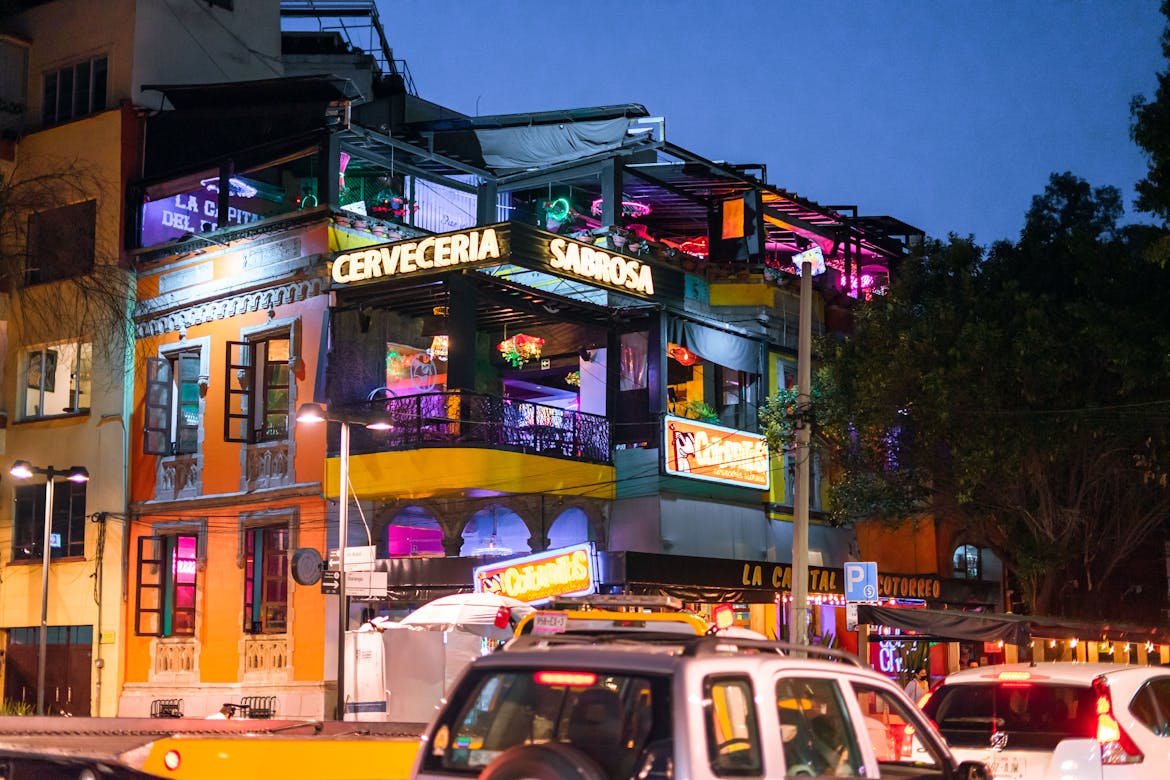
Mexico City is a truly exhilarating destination, and a few practical tips can greatly enhance your visit, helping you navigate its unique culture and vast urban landscape with ease. From understanding local customs to managing practicalities, these pointers are designed to ensure your trip is as smooth and enjoyable as possible.
- Be Mindful of the Altitude: Mexico City sits at an elevation of over 2,200 meters (7,200 feet), which can affect some visitors. Take it easy on your first day, stay hydrated (with bottled water!), and avoid excessive alcohol or strenuous activity initially. Listen to your body to prevent altitude sickness.
- Drink Only Bottled Water: While tap water in some parts of Mexico might be treated, it’s a golden rule for travelers to always drink bottled or purified water. This also applies to ice in drinks and washed produce, unless confirmed they’ve been prepared with purified water. Staying hydrated is key, especially at altitude.
- Understand Tipping Culture (La Propina): Unlike some other countries, tipping (la propina) is customary and expected in Mexico, particularly in restaurants, bars, and for service providers. A tip of 10-15% is standard in restaurants for good service, and rounding up fares for taxi drivers or tipping a small amount for quick services is appreciated.
- Practice Basic Spanish Phrases: While many people in tourist areas may speak some English, knowing a few basic Spanish phrases will significantly enhance your interactions and show respect for the local culture. Simple greetings like “Hola,” “Gracias,” “Por favor,” “Disculpa,” and “Cuánto cuesta?” (How much does it cost?) go a long way.
- Prioritize Safety & Awareness: Like any major global city, it’s wise to stay aware of your surroundings. Keep valuables secure, avoid walking alone late at night in unfamiliar areas, and be cautious with street vendors. Using ride-sharing apps is generally recommended over hailing street taxis for safety and transparency.
- Embrace Street Food (Wisely): Mexico City is a paradise for street food, offering incredible flavors at unbeatable prices. While you should absolutely embrace the street food scene, it’s wise to choose vendors with long lines (indicating freshness and popularity) and visible hygiene practices. Trust your gut (literally!) and enjoy the culinary adventure.
- Carry Small Bills & Coins: While card payments are common, many smaller vendors, street food stalls, local markets, and taxis (if you use them) primarily operate on cash. Always carry a good supply of small peso bills (20, 50, 100) and coins to make transactions easier and avoid issues with vendors not having change.
- Prepare for Varied Weather & Sun: Mexico City generally enjoys pleasant temperatures, but its high altitude means intense sun during the day, even if it feels cool. Pack layers, as temperatures can drop in the evenings. Always use high-SPF sunscreen, wear a hat, and consider sunglasses, as the sun can be deceivingly strong.
Mexico City is a place of endless discovery, where the echoes of ancient civilizations resonate through bustling modern streets and vibrant cultural expressions. From its grand historical core to its lively neighborhoods, incredible food, and captivating arts scene, the city offers an unparalleled experience that stimulates all the senses. We hope this guide helps you navigate its complexities and uncover the deep layers of beauty and history that make Mexico City truly unforgettable.
Discover Mexico City's dynamic blend of ancient history, vibrant culture, and world-class gastronomy. Explore its iconic landmarks...
Explore Copenhagen's enchanting blend of historic charm and modern design with our guide. Discover iconic landmarks, vibrant scene...